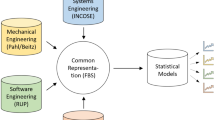Abstract
Complex engineering systems execute within different contexts and domains. The heterogeneity induced by these contexts is usually implicitly handled in the development cycle of such systems. We claim that reducing this heterogeneity can be achieved by handling explicitly the knowledge mined from these domains and contexts. Verification and validation activities are improved due to the expression and verification of new constraints and properties directly extracted from the context and domains associated to the models. In this paper, we advocate the use of domain ontologies to express both domain and context knowledge. We propose to enrich design models that describe complex information systems, with domain knowledge, expressed by ontologies, provided by their context of use. This enrichment is achieved by annotation of the design models by references to ontologies. Three annotation mechanisms are proposed. The resulting annotated models are checked to validate the new minded domain properties. We have experimented this approach in a model driven engineering (MDE) development setting.
Access this chapter
Tax calculation will be finalised at checkout
Purchases are for personal use only
Similar content being viewed by others
References
Aït Ameur, Y., Méry, D.: Making explicit domain knowledge in formal system development. Sci. Comput. Program. 121, 100–127 (2016)
The NoseGear Case Study. http://www.cl.cam.ac.uk/mjcg/FMStandardsWorkshop/NoseGear.html
Grube: toward principles for the design of ontologies used for knowledge sharing (1993)
Jean, S., Pierra, G., Aït Ameur, Y.: Domain ontologies: a database-oriented analysis. In: Filipe, J., Cordeiro, J., Pedrosa, V. (eds.) WEBIST 2005/2006, LNBIP, vol. 1, pp. 238–257 (2006)
Ontology web language. http://www.w3.org/2001/sw/wiki/OWL
ISO: Parts library - part 42: Description methodology: Methodology for structuring parts families, ISO ISO13584-42 (1998)
ISO: Parts library - part 25: Logical resource: Logical model of supplier library with aggregate values and explicit content, ISO ISO13584-25 (2004)
RDF Schema. http://www.w3.org/TR/rdf-schema/
Hacid, K., Aït Ameur, Y.: Strengthening MDE and formal design models by references to domain ontologies, a model annotation based approach. In: ISOLA (2016, to appear)
Jean, S.: OntoQL, an exploitation language for ontology-based databases, Theses (2007)
The NoseGear Case Study. http://www.cl.cam.ac.uk/mjcg/FMStandardsWorkshop/sampleCode.pdf
Boudjlida, N., Panetto, H.: Annotation of enterprise models for interoperability purposes. In: IWAISE, April 2008
Wang, Y., Li, H.: Adding semantic annotation to UML class diagram. In: ICCASM (2010)
Lin, Y., Strasunskas, D.: Ontology-based semantic annotation of process templates for reuse. In: CAiSE (2005)
Lin, Y., Strasunskas, D., Hakkarainen, S., Krogstie, J., Solvberg, A.: Semantic annotation framework to manage semantic heterogeneity of process models. In: CAiSE (2006)
Carvalho, V.A., Almeida, J.P.A., Guizzardi, G.: Using reference domain ontologies to define the real-world semantics of domain-specific languages. In: CAiSE (2014)
Consortium: Formal models for ontologies, Technical report (2015)
Abrial, J.R.: Modeling in Event-B - System and Software Engineering. Cambridge University Press, New York (2010)
Author information
Authors and Affiliations
Corresponding author
Editor information
Editors and Affiliations
Rights and permissions
Copyright information
© 2016 Springer International Publishing Switzerland
About this paper
Cite this paper
Hacid, K., Ait-Ameur, Y. (2016). Annotation of Engineering Models by References to Domain Ontologies. In: Bellatreche, L., Pastor, Ó., Almendros Jiménez, J., Aït-Ameur, Y. (eds) Model and Data Engineering. MEDI 2016. Lecture Notes in Computer Science(), vol 9893. Springer, Cham. https://doi.org/10.1007/978-3-319-45547-1_19
Download citation
DOI: https://doi.org/10.1007/978-3-319-45547-1_19
Published:
Publisher Name: Springer, Cham
Print ISBN: 978-3-319-45546-4
Online ISBN: 978-3-319-45547-1
eBook Packages: Computer ScienceComputer Science (R0)




